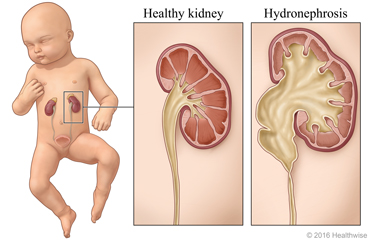Learning About Fetal Hydronephrosis
What is hydronephrosis?

Fetal hydronephrosis is swelling of a baby's kidney caused by a buildup of urine. This can happen while the
baby is still in the mother's uterus. Doctors often find the problem when a woman has a fetal ultrasound
during pregnancy.
Urine normally travels from the kidney down a narrow tube to the bladder. This narrow tube is called the
ureter. The urine drains out of the bladder through another small tube called the urethra.
A kidney may swell if your baby's ureter is blocked and urine can't flow from the kidney to the bladder. Or
your baby's kidney may swell if urine that's already in the bladder flows back up into the kidney.
What can happen when your baby has it?
For many babies, this condition goes away just before or after the baby is born.
Kidney swelling that is present after your baby's birth may be a sign of a kidney problem. It might also be a
sign of a problem with your baby's ureter or bladder. These problems could lead to infections or other kidney
issues.
What tests might your baby have?
After your baby is born, your doctor will do a test to see if there is still a problem. If a problem is
found, your baby's doctor will do more tests. These tests help the doctor know what type of treatment your
baby needs.
Your baby may not have all of these tests. Tests may include:
-
Ultrasound. This test helps the doctor look at your baby's kidneys and bladder. It can show if the
swelling is getting better.
-
Renal scan. This test shows how well your baby's kidneys are working.
-
X-ray. This test shows how well your baby's bladder is working.
-
Voiding cystourethrogram (VCUG). This is an X-ray test. It shows how your baby's bladder and
urethra are working while he or she is urinating.
How is it treated?
If your baby's kidney is still swollen after birth, the doctor may give your baby antibiotics. This can help
prevent infection.
Your baby's doctor may talk to you about surgery to correct a blockage problem. But this would only happen if
the problem is severe. Most babies will not need surgery.
Follow-up care is a key part of your child's treatment and safety. Be sure to make and go to all
appointments, and call your doctor if your child is having problems. It's also a good idea to know your
child's test results and keep a list of the medicines your child takes.
Current as of: November 15, 2023
Content Version: 14.0
Care instructions adapted under license by your
healthcare professional. If you have questions about a medical condition or this instruction, always ask
your healthcare professional. Healthwise, Incorporated disclaims any warranty or liability for your use of
this information.